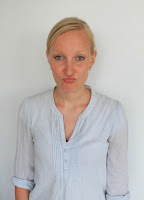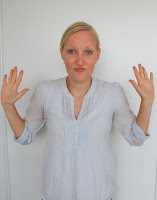or how many kisses in English? A question a foreigner in France will find themselves wondering everytime a French person leans over to give them kisses on the cheek. It is two in western France (where I live), three in southern France and four in the North. But don't quote me on it because it always depends.
Having lived in France for a year, some of the French body language has been demystified for me and some still remains a bit confusing. However, it is an essential part of the French culture and understanding it will help you a great deal in France. I have had to educate myself on this topic because when I first came to France I had a lot of difficulty understanding many different gestures. To help you out, in case you are ever planning a trip to France, I decided to present to you the top 10 (in no particular order) of French gestures. I have picked the ones that I most commonly come across. Some of them are normal, everyday gestures and others are informal and only used with people you know well.
So read on as I hope the information will someday prove useful to you!
1. Faire la bise
Kissing on the cheek is a sign of greeting or saying goodbyes between friends and family in France. The number of kisses varies by the region but in most parts of France two cheek kisses are used and the right cheek is kissed first. Usually two men do not exchange "bises" but you occasionally see this happen as well, so men coming from other cultures should not freak out and consider it offensive if this happens. Also, remember that the lips do not really touch the cheek. The "bises" are not supposed to be big, wet smooches!
Kissing on the cheek is a sign of greeting or saying goodbyes between friends and family in France. The number of kisses varies by the region but in most parts of France two cheek kisses are used and the right cheek is kissed first. Usually two men do not exchange "bises" but you occasionally see this happen as well, so men coming from other cultures should not freak out and consider it offensive if this happens. Also, remember that the lips do not really touch the cheek. The "bises" are not supposed to be big, wet smooches!
 |
| Faire la bise |
2. Bof
Bof or the gallic shrug is usually a sign of indifference or disagreement. It could mean any of the following: It's not my fault, I don't know, I doubt it, I don't agree or I don't really care. Raise your shoulders, hold up your hands with your palms facing out, stick out your lower lip, raise your eyebrows and say "Bof !"
Bof or the gallic shrug is usually a sign of indifference or disagreement. It could mean any of the following: It's not my fault, I don't know, I doubt it, I don't agree or I don't really care. Raise your shoulders, hold up your hands with your palms facing out, stick out your lower lip, raise your eyebrows and say "Bof !"
3. Faire la moue
The "French pout" expresses discontentment. Faire la moue is the most apparent when the French have to wait for long periods of time or they don't get their way but it expresses pretty much any negative emotion. To faire la moue pucker up your lips pushing them forward, squint your eyes and look bored.
4. J'ai du nez
The "French pout" expresses discontentment. Faire la moue is the most apparent when the French have to wait for long periods of time or they don't get their way but it expresses pretty much any negative emotion. To faire la moue pucker up your lips pushing them forward, squint your eyes and look bored.
 |
| Faire la moue |
J'ai du nez literally means that you have a good nose for sensing something. You tap your nose with your index finger to gesture that you clue into the truth faster than others or that you are clever.
 |
| J'ai du nez |
To indicate that you need money or that something is very expensive, you hold your hand up and slide your thumb back-and-forth across your fingertips. This hand gesture is self-explanatory but you may accompany this gesture by saying du fric! (which is a colloquial form of money or "dough").
 |
| du fric |
Mon œil is a French expression that literally means "my eye" but can be translated to English meaning my foot!, yeah, right! or no way! to express disbelief. To do this gesture, pull down the skin under your eye with your index finger and say "mon œil!".
 |
| Mon œil |
This gesture ought not to be confused with the North American OK sign! In France, when you make a circle with your index finger and your thumb you are signalling that something is "worthless" or "nothing"!
 |
| Zéro |
This expression could be translated as ouch! or owe! owe! owe! and the French use it to say that someone's in trouble. They accompany this saying with a gesture holding up the palm of their hand close to their chest and shaking it up and down.
 |
| Aïe, aïe, aïe |
Avoir un verre dans le nez = to have a glass in your nose means that you are slightly drunk. The saying combines a glass as a sign of alcohol and the nose as a body part that becomes red if you drink too much. Make a loose fist, twist it in front of your nose while tilting your head to the other direction and say: il a une verre dans le nez!
 |
| Avoir une verre dans le nez |
Literally means What a beard! but can be translated as what a drag! or so boring! You can use "quelle barbe!", "la barbe!" and "une vraie barbe" to mean the same thing. Fold your hand and stroke your cheek up and down with the back of your fingers while saying: Quelle barbe!
 |
| Quelle barbe |
Well, there you have it. A handful of gestures which help you to understand French communication better. These gestures are usually not taught in school but you come across them everyday. In France there seems to be a physical gesture to almost everything so you can get your message across even when there are no words!
